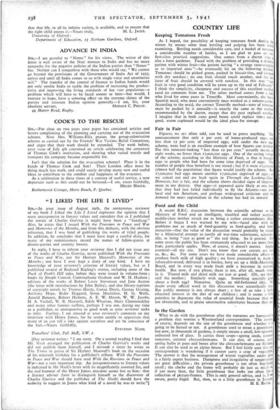Food and the Child A recent B.B.C. discussion between the
scientific adviser to the Ministry of Food and an intelligent, troubled and rather sceptical middle-class mother struck me as being a rather extraordinary affair. Before it began I was warned by my wife—faced also with the problems not so much of food-quantity as food-quality and food- attraction—that the value of the discussion would probably be ruined by a Ministerial attempt to justify all war-time substitutes, scientific- ally, as being "just as good as " the real thing. So it proved. For some years the public 'has been strenuously educated to eat more fresh fruit, particularly apples. Now, of course, it doesn't matter. Apples essential—all my eye. Don't you know that raw carrots are just as, &c., &c. For some years we have made considerable efforts to produce fresh milk of high quality ; we have pasteurised it, made tuberculin-tested, delivered it in bottles, have set up a Milk-Marketing Board, and in every way made fresh milk a keystone in_national health. But now, if you please, there is not, after all, much virtue in it. Tinned milk and dried milk are just as good. (Oh, are they? said the mother.) Similarly with eggs. Something specially good about a fresh egg? Nonsense. Quite an old-fashioned idea. Nt doubt every official word in this discussion was scientifically true But public memory is not always short ; a few of us take a fairly educated interest in the diet of our children ; and it seems a little pointless to deprecate the value of essential foods because they an not obtainable, and to praise unattractive substitutes because they are


























 Previous page
Previous page